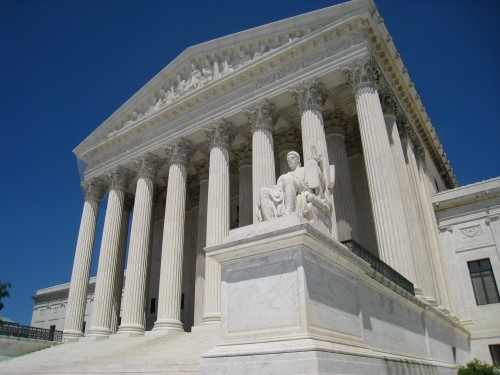In the United States, we have a monopoly government by judiciary.
Not only have we monopolized almost all power at the federal level, we have placed nearly unlimited authority in the hands of nine federal employees staffing the Supreme Court. On top of exercising virtually unlimited veto power over every state and local law, these politically connected lawyers also define and enforce their conception of rights on some 350 million people.
 Tuesday served up another example of monopoly governance when the Supreme Court agreed to hear a case involving religious advertising in a Phoenix suburb.
Tuesday served up another example of monopoly governance when the Supreme Court agreed to hear a case involving religious advertising in a Phoenix suburb.
It seems the town of Gilbert allows political signs to measure 32 square feet, and they can remain on display for indefinite time periods. But the city ordinance limits signs from churches and similar groups to six square feet and 14 hours of display time. On top of that, according to the petition for certiorari filed by the Alliance Defending Freedom, political signs get prime space, while the city relegates church signs to less noticeable locations.
The ADF argues that Gilbert’s sign policy violates the First Amendment rights of churches.
So, Americans will line up and stare angrily across the aisles from each other, waiting with baited breath until the judges hand down their opinion from on high. Then, the winners will cheer and claim a great victory, while the losers will foam at the mouth and claim the Court committed a grave injustice.
Stop for a moment and consider the absurdity.
In all likelihood, five politically connected lawyers 2,290 miles away will determine sign policy for 208,453 Arizonans. Even more absurd, the opinion of these federal employees will become constitutionalized, therefore binding nearly 350 million people to their views on sign policy.
American governance was never meant to function this way. The Constitution does not empower the federal government to dictate sign policy in American towns. The Constitution does not empower the federal government to hold veto power over every state and local law. And the Constitution does not empower the Supreme Court to become a liberty enforcement squad operating in every state and city in the Union.
In fact, a proposal to give the federal government veto power over state laws was actually proposed and debated during the Philadelphia Convention. It was rejected. James Madison proposed that several of the Amendments in the Bill of Rights would apply to both the federal government and the states. That was also rejected. The founding generation feared centralized power more than anything. So, the people ratified a Constitution forming a federal government with limited powers and authority, and left most powers to the states and the people.
Sign policy in Gilbert, Ariz., is not a federal issue.
Period.
“What about the 14th Amendment?” you might ask. What about it? It was never intended to apply the Bill of Rights to the states. That was a Supreme Court invention yanked out of thin air some 60 years after the ratification of the 14th. The 14th was intended to protect specific rights outlined in the Civil Rights Act of 1866. Vocal 14th Amendment advocate Rep. Martin Thayer (R-Pa.) declared while stumping for ratification, “It is but incorporating in the Constitution the principle of the civil rights bill which has lately become a law.” (More on the 14th HERE.)
Constitutional issues aside, why would anybody want five lawyer-politicians defining and enforcing their version of rights on the entire United States? Would you cheer a Walmart monopoly on groceries in the U.S.? If not, why do you cheerlead monopoly government?
Arizona has a state constitution. It has a declaration of rights protecting freedom of speech and religion. This issue should have been settled in Arizona courts. Sure, Arizona judges might have mucked it up. But I’d argue the U.S. Supreme Court has a pretty good chance of mucking it up too. And when they concoct some twisted version of sign rights, it will apply to everybody, not just Arizonans.
Monopoly.
That’s a bad system.
Power should remain decentralized, not monopolized. Decentralization allows people to vote with their feet. It allows local views to prevail. It compartmentalizes bad policy. It does not stuff the views of a majority of nine federal attorneys down everybody’s throat.
Monopoly makes for a great game. It makes for a crappy system of government.


